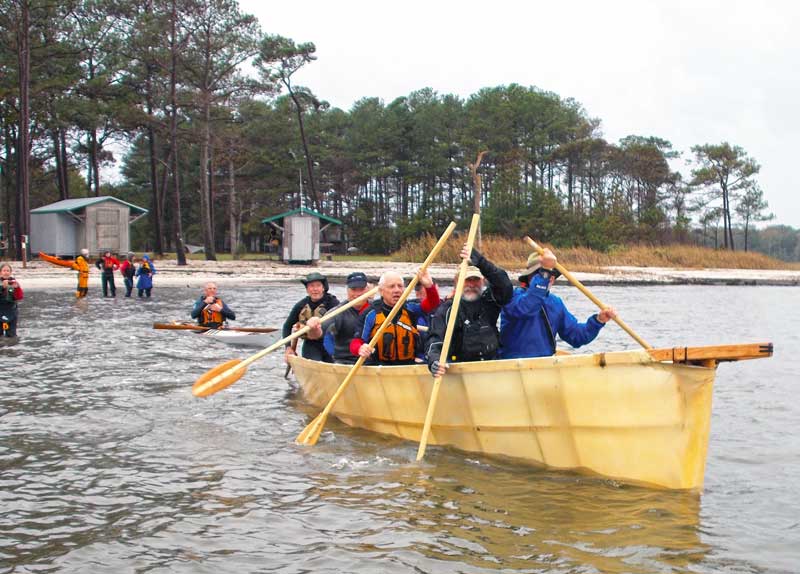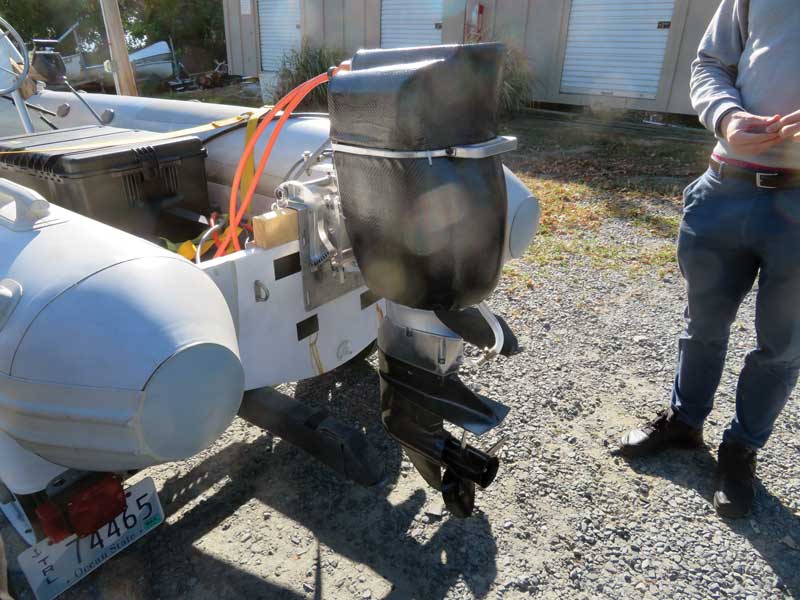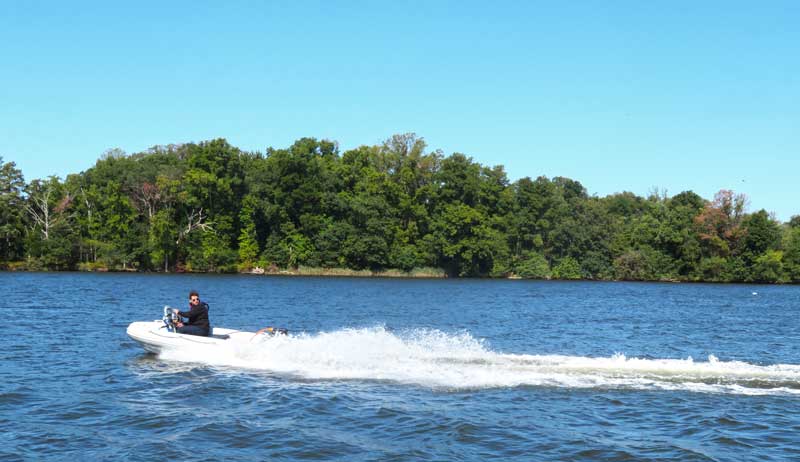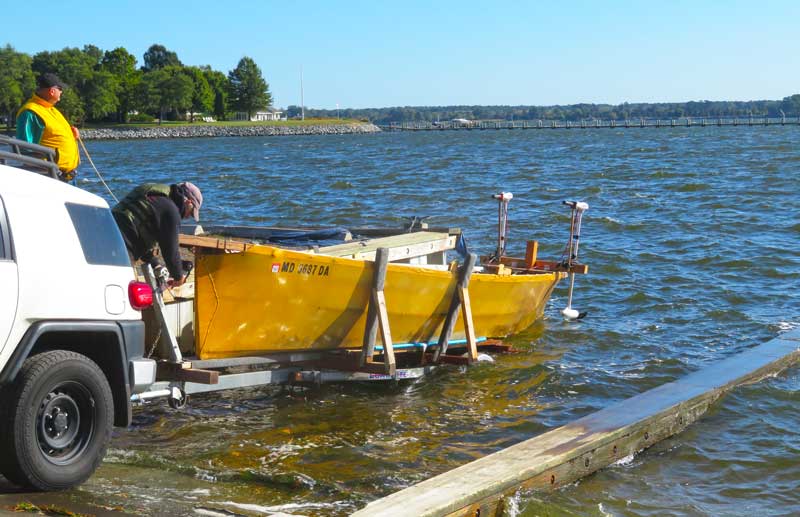Do you have an electric boat? Are you thinking of getting one? Are you just interested in electric propulsion? Just curious? If so, you need to look into the Wye Island Electric Boat Marathon, with its 20th edition currently scheduled for October 2, 2020. Last years’ event was a bit lumpy, but often the Marathon is a good-weather quiet tour around one of the prettiest waterways imaginable.

The 19th annual Wye Island Challenge Electric Boat Marathon took place on October 5, 2019 (postponed from October 4 due to weather) at the Miles River Yacht Club (MRYC) in St. Michaels, MD. The 24-mile race begins and ends at MRYC and is put on by the Electric Boat Association of America. Ben Sorkin took home the 2019 overall win with a new Flux Marine Outboard and set a monohull record of one hour, 22 minutes, averaging just under 18 mph.
Race Recap:
The 2019 Wye Island Challenge was an exciting race that welcomed a mix of veteran and first-time racers. Due to high winds, the Friday race was pushed back from October 4 to the 5th, yet the Saturday weather conditions were still formidable. A number of possible entries decided against competing, but the six entries confirmed despite the challenging forecasts all made the start. Ultimately only three finished, but there were no injuries and no significant boat damage.

As is usual for the Marathon, entries were an eclectic mix of interesting boats. Ben’s Flux Marine entry was a rigid inflatable, as was the Pure Watercraft entry with Andy Rebele at the helm. This was the first time the Marathon saw rigid inflatables with significant power. The Pure Watercraft team set the overall course record in 2017, with its outboard powering a Stillwater catamaran. The 2019 entry was a borrowed boat, with the Pure Watercraft outboard system.
A newcomer to the challenge, Ben Sorkin and his team demonstrated a new 30-HP prototype outboard from Flux Marine and established a new course record for the Single Hull Unlimited class, completing the course in 1:22. The second place finisher, Paul Kydd, first in the multihull division, is far from a newcomer to the Marathon, having competed in the first one, and nearly every one since, in five different boats. Paul’s time was 2:01, identical to last year: a minute off his personal two-hour target. Paul and Ben share an alma mater: Princeton; Paul in the class of 1952 and Ben in 2017.
Third place went to a monohull, former record holder Erged On, which has now been reconfigured by the Washington College team, with a solar panel system, running only in displacement mode. Erged On finished in 4:55.
The two RIBs ran close to each other most of the way around the course, with Ben in the Flux entry finally pulling away as the safety circuitry on the Pure Watercraft boat shut its motor down. Although a restart got it going for a while, the system shut down for good at the mouth of the Miles River. Look for a rematch in October 2020.

The Ryan Goold hydrofoil entry encountered waves just a bit too large and suffered minor damage which inactivated its pitch control system. Unfortunately, a hydrofoil boat with the hull and foils in displacement mode is not efficient, so the boat retired with limited battery.
Ralph Young’s Greenland Umiak had no trouble with the conditions but was running low on batteries, so Ralph decided to haul out at Wye Landing. Right—a Greenland Umiak configured with some batteries and a couple of Minn Kotas, rather than a team of paddlers. The Umiak is a frame, covered with cloth, but a lot larger than kayaks we’ve all seen with that type of construction. Ralph’s boat was the slowest in the fleet, but in the Wye Marathon, that’s not all bad. Look for the Umiak to be back next Fall.
Because of the weather-related delay, the victory banquet was held the night before the race rather than the night after. The hospitality of the Miles River Yacht Club was once again superb. Maybe the banquet should always be before the race.

Classes
In the Electric Boat marathon, there are six classes of racing: three for single hulls, two for multihulls, and a class for any boat that competes not for speed, but just for the pleasure of touring one of the prettiest waterways anywhere.
In the single hull division:
- Class 1, Lead/Acid Batteries: Any single hull boat with a length to beam ratio less than six to one and utilizing lead/acid batteries. Entrants in this class will be handicapped by waterline length (1.34 times the square root of the waterline). This will allow smaller boats to compete with larger ones. (Note, motor/s must be rated less than 8kw.)
- Class 2, Advance Batteries: Any single hull with a length to beam ratio less than six to one and utilizing non-lead/acid batteries or running off a fuel cell. Because of the likelihood of these boats running the entire course at planing speeds, this class will not be handicapped by waterline length. (Note, motor/s must be rated less than 8kw.)
- Class 3, Extreme Class: Any single hull boat with a length to beam ratio greater than six to one, or a motor kilowatt rating greater than 8kw. Any type of battery or fuel cell is allowed. No handicaps.
In the Multihull division:
(Any form whose intended purpose is to contribute buoyancy to the boat while it is at rest is considered a hull. There are no handicaps in the multihull classes.)
- Class 4, Lead/Acid Batteries: Any boat with two or more hulls utilizing lead/acid batteries.
- Class 5, Advanced Batteries: Any boat with two or more hulls utilizing non-lead/acid batteries or running off a fuel cell.
Picnic class:
Class 6 Picnic Class: This class celebrates what the vast majority of electric boats are all about—quiet, pollution-free enjoyment on the water. The idea of the Picnic Class is not to see who can travel the fastest around the course, but rather who can travel the picturesque Wye Island Challenge course with the most enjoyment and style. Boats registered for the classes above are also eligible to enter in the Picnic Class.
To compete in this class, the boat must meet the following criteria:
- It cannot exceed 8 mph average speed, (the optimum hull speed for a 30-foot boat).
- It must have seating for at least two persons, and additional points will be awarded for any passengers beyond the pilot.
- The boat must contain at least one live cut flower.
By Daylin Frantin, Flux Marine Ltd and Charlie Iliff